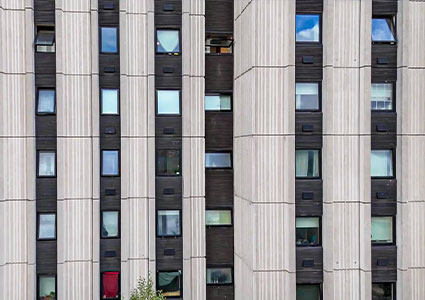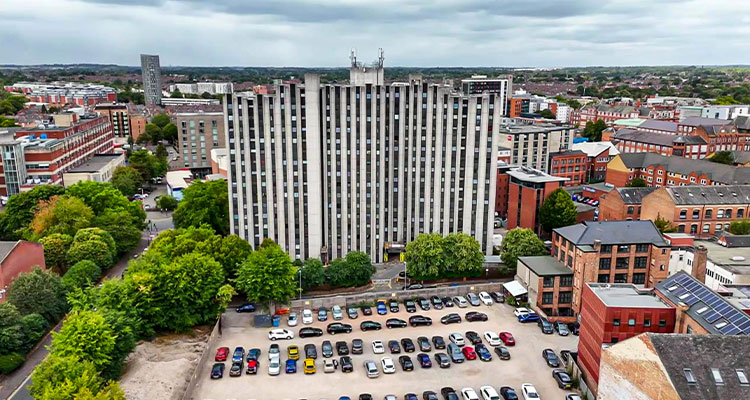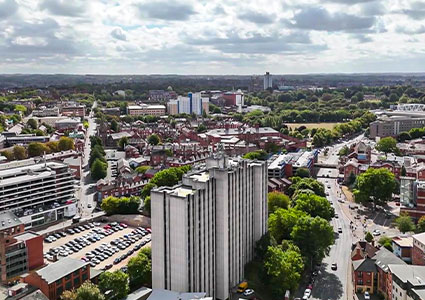Discover how Guildmore redefines construction with sustainable solutions and community-focused partnerships
Through its four specialised business units, Guildmore offers comprehensive construction, cladding, refurbishment and property solutions tailored to the unique needs of clients and communities across England. To actively contribute to the communities it serves, the company prioritises long-term partnerships, investing in employee development, and upholding environmental responsibility. Overall, Guildmore’s mission is to achieve sustainable growth while establishing itself as a leader in sustainability and corporate responsibility. Brett Bussey, Director of the company’s Midlands and North operations, discusses Guildmore’s background and expansion into these regions.
“Incorporated in February 1998, we are a family-owned business with 25 years of experience partnering with local authorities, housing associations and clients within the private sector. Our company comprises four business units: construction, facades and cladding, planned works, and a newly incorporated unit serving the Midlands and North. The first three units predominantly operate in London, the Southeast and the South Coast. While we are a large business with a turnover of £120 million this year, what truly sets us apart is that we are a people-focused, family-owned company, unlike many of our competitors, who are corporate entities prioritising investors,” he opens.
within the private sector. Our company comprises four business units: construction, facades and cladding, planned works, and a newly incorporated unit serving the Midlands and North. The first three units predominantly operate in London, the Southeast and the South Coast. While we are a large business with a turnover of £120 million this year, what truly sets us apart is that we are a people-focused, family-owned company, unlike many of our competitors, who are corporate entities prioritising investors,” he opens.
Recently, Guildmore has been focused on establishing the Midlands business unit, which Brett oversees. We learn more about the reasons behind this targeted expansion. “Feedback from clients, consultants, and stakeholders in the Midlands indicated a demand for fresh providers, rather than the large corporates that already dominate the region. One of our core principles is that if a customer has a problem, they should bring it to us, and we will tackle it head-on and give them a solution. In contrast, many incumbents, especially in areas such as cladding remediation and other building safety aspects, often struggle to deliver timely responses on-site. This is why we chose to expand into the Midlands, and we are already seeing success in the area,” Brett reveals.
Transparent partnerships
Delving further into Guildmore’s operations in the Midlands and North of England, Brett sheds light on the division’s main purpose. “We are heavily involved in tendering, with energy efficiency being a major focus, particularly through decarbonisation projects and frameworks. The recent launch of the Warm Homes: Social Housing Fund (WHSHF) Wave 3 presents new opportunities, especially for smaller housing associations in the Midlands and North of England that often lack the resources of larger organisations. Many of these associations also did not have the resources to bid for Wave 3 funding. Our goal is to work with these organisations and provide support and guidance to access alternative sources of funding beyond just WHSHF Wave 3. We can help them access alternative sources of funding, sometimes at no cost to them, which leads to positive outcomes for everyone involved. However, we are aware that the cladding remediation work has a sell-by date. Once we complete these projects, there will be no more opportunities for work in that field. Therefore, my vision for the Midlands and North is to expand our focus to include other works, such as decarbonisation and long-term planned investment frameworks. With the UK’s commitment to achieving Net Zero, and the government’s push for this initiative at the local authority level, I see significant potential for sustainable growth in these areas.”
Evidently, sustainability is a top priority for Guildmore as it continues to grow and take on new projects. Brett describes the company’s collaborative approach to integrating eco-friendly features while keeping its clients’ needs and budget in mind. “Our ability to implement sustainable practices largely depends on how clients secure funding for their projects. Ideally, we prefer to install all measures in one continuous visit to the property rather than spending 12 months on a building and then returning six months later to repeat the process and put up scaffolding again. Thus, we strive to collaborate with our clients to secure funding at the same time so that we can upgrade the energy efficiency and fire safety of their buildings. When clients partner with us, they benefit from our focus on achieving cost savings rather than simply maximising our own profit. Instead of just charging for scaffolding and cladding work now and following up for solar panel installation later, we propose a more integrated approach. We encourage and assist our clients to submit their funding applications by the same deadlines as ours and if needed, we can delay the start of the project to ensure that when we do start working on-site, we can complete everything in one go. Our clients value this level of honesty and partnership,” he explains.
 Project portfolio
Project portfolio
In July 2025, Guildmore began construction on a notable project in Leicester for Platform Housing Group, which Brett is eager to tell us more about. “This project is called De Montfort House and consists of replacing the external spandrel panels. Inside, it is a full refurbishment of all the communal areas of a 16-storey block, which encompasses replacement of suspended ceilings, full redecoration of walls, floors, and fire door replacements. Additionally, we are refurbishing approximately 25 empty properties to meet decent home standards. This will involve relocating residents as we upgrade their new flats and work on the entire building. We are also upgrading the building’s fresh air ventilation systems, smoke extraction systems, fire alarms and bin chute works.”
Brett goes on to discuss another key project currently underway at Guildmore. “Our Boardwalk Place project in Canary Wharf represents a comprehensive facade remediation and internal fire stopping across a site that spans 60 acres and includes 16 blocks. Internally, the work includes replacing pipe pads, collars and letterboxes above doors to ensure proper compartmentalisation between communal areas and flats. We are also replacing fire doors and thresholds to meet compliance standards. We are already underway and in contract, which is crucial since the project involves a long Building Safety Regime (BSR) process. Some blocks require gateway submissions, while others do not. Our strategy focuses on sequencing and phasing the work suitably so that we can start the submission process while simultaneously progressing with internal works. We aim to phase the low-rise buildings first, enabling us to commence work earlier while we await BSR submissions. Our goal is to keep the project moving smoothly and do everything once rather than needing to come back and finish it at a later date. Bellway has been a great client, and we are proud to collaborate with them on this project,” he ends.

 Project portfolio
Project portfolio